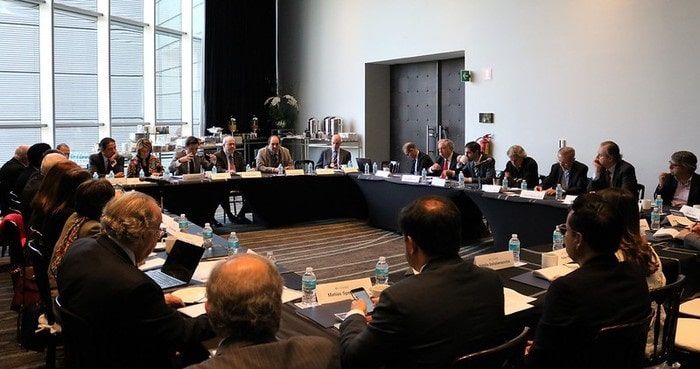Political and Economic Crisis in Latin America: Causes and Main Challenges for the Region
What is happening is the weakening of the social contract, which refers to the implicit pact between the state and citizens, thus, resulting in the political and economic crisis in Latin America.

The Development Centre of the Organisation for Economic Co-operation and Development (OECD), the Economic Commission for Latin America and the Caribbean (ECLAC), and the Andean Development Corporation (CAF) in their 2018 report warned that despite income progress, 25% of Latin Americans still live in poverty. Moreover, 40% who escaped it are part of a group that, for the most part, is made up of informal workers, who face great uncertainty about being kept out of poverty.
The 40% of people in Latin America and the Caribbean who escaped poverty are part of a group that consists mostly of informal workers. This middle class, which is not yet consolidated because it faces great uncertainty about being kept out of poverty, has consumption aspirations associated with its condition, although its income does not allow it to cover them. Therefore, the vulnerable middle class feels insecure when economic conditions are less favorable. The 2018 Latinobarómetro survey showed a decline in the middle class in 11 countries in the region between 2013 and 2018.
Argentina leads the way in the decline, going from 50% to 36%. In the rest of South America, the decreases in Peru from 48% to 37%, Venezuela from 38% to 30%, Paraguay from 43% to 36%, Bolivia from 53% to 49%, Brazil from 28% to 26%, and Ecuador from 51% to 50% are noteworthy. Conversely, in Colombia, it increased from 34% to 35%, and in Chile from 30% to 37%.
The uncertainty becomes evident when people are asked if they are worried about becoming unemployed in the next 12 months. In South America, 60% of respondents in Brazil are very worried about losing their job, 59% in Ecuador, 56% in Bolivia, 53% in Venezuela, and 51% in Chile, all above the Latin American average (42%).
In terms of wages, they were asked whether their total family income was sufficient to cover their needs. Forty-seven percent of the Latin Americans interviewed said that it was not enough and that they, therefore, faced difficulties. If the Venezuelan case is not considered, due to the humanitarian crisis that the country is going through, Colombia, Peru, Chile and Argentina stand out, where more than 44% of the population surveyed considers that their income is not enough.
In the particular case of Colombia, 5 out of 10 citizens have difficulties covering their needs with the income received by their family group. Likewise, the Latinobarómetro 2018 survey, in the question related to income distribution, shows that in Latin America only 16% of the population considers it to be fair. In Chile, 8% of those surveyed say it is fair, in Peru, 12%, and in Colombia, 14%. The country that shows a more favorable result is Ecuador, with 29%. Thus, in an environment where the middle class decreases, there is uncertainty about becoming unemployed, there are perceived problems of income and inequality in its distribution, which affects the perception that people have about their political leaders and, more specifically, the management of the government of the day.
Paraguay, below average
In that sense, the approval percentage of governments in Latin America went from a maximum of 60% in 2009 to 32% in 2018. When looking at the results by country, the cases of Argentina and Paraguay stand out, with 23%; Venezuela (24%); Peru (28%), all below the Latin American average. But the most serious change that occurred in the region is that support for democracy reached a low point during 2018 (48%), according to Latinobarómetro, after seven consecutive years of decline. In addition, citizens who withdrew their support for democracy declare themselves indifferent to the type of regime (28%) and there are even 15% who prefer an authoritarian regime.
What is happening is what the Development Center of the Organization for Economic Cooperation and Development (OECD); the Economic Commission for Latin America and the Caribbean (ECLAC) and the Andean Development Corporation (CAF) call the weakening of the social contract, which refers to the implicit pact between the state and citizens. This has occurred, among other factors, because of dissatisfaction about the provision of public services by the State; the perception of deterioration in people's well-being; and corruption scandals.
Monica de Bolle, a member of the Peterson Institute for International Economics in Washington, D.C., told the Financial Times that the current crisis in Latin America is based on the tunnel theory, which describes drivers who are stuck in traffic in a tunnel, where suddenly the next lane begins to move, but the lane you are driving in does not. In other words, there is no direct gain for you. Moreover, he says, as expectations of mobility are diminished or frustrated, a sense of anger and revolt is generated in people.
Decreased opportunities
For Marta Lagos, director of Latinobarómetro, the causes of what is happening in the region lie in the economic stagnation or slowdown; the reduction of opportunities, and the fear of falling back into poverty amid persistent inequality. This was pointed out to The Economist magazine at the end of November. Lagos also noted that while the gap between rich and poor has not widened in Latin America, it has become more visible. In addition, the OECD, ECLAC, and CAF point out that the middle-income trap (MIT) is affecting most of the region's economies. This term refers to the fact that as countries in Latin America and the Caribbean reach middle-income levels, growth may experience a lasting slowdown, as new engines of economic growth are needed to enable them to move towards higher income levels.
They point out that, according to empirical evidence, overcoming the IMR is achieved in more open economies that can export goods with high value-added; that have better quality education, with an adequate supply of skills; greater investment, and developed capital markets; the rule of law; strong democracy and solid tax collection. To moderate the current social discontent, The Economist comments that long-term policies are needed. These include higher growth; more progressive taxes; higher minimum wages; and better social provision. However, the issue of growth requires productivity increases, which makes unpopular reforms necessary in many cases.
In summary, the commodity supercycle that drove economic expansion in the mid-2000 generated social mobility and created a new middle class, although this class was more vulnerable to external shocks than the consolidated middle class since it is mostly made up of people working in the informal market. Thus, as the region slows down, it will generate an environment conducive to social tensions. In fact, by 2019, the International Monetary Fund (IMF) estimates that the region will grow by only 0.2%. While population expansion is expected to be 1.0%, according to World Bank figures for recent years, this would lead to a decline in per capita GDP this year.
This scenario, combined with external uncertainty, is generating stagnation in social plans and deficient provision of public services. Moreover, the diaspora generated by Venezuela's economic implosion has increased the difficulties in the region, as it has been concentrated mainly in countries such as Peru and Colombia, where the less favored sectors of the population report that migrants are stealing their jobs, causing serious problems of xenophobia, which manifested itself through expulsions of groups of people from certain localities; physical violence; burning of homes and goods, among others.
In this context, for example, the Inter-American Development Bank (IDB) supports the need for LAC economies to accelerate the implementation of structural reforms, which would allow them to stimulate growth and improve social results. Among the main priorities are additional openness to international trade and foreign direct investment; rationalization of regulations in goods and labor markets; promotion of competition; investment in infrastructure and education; and preservation or expansion of well-targeted social programs.
Finally, the OECD, ECLAC, and CAF comment that institutions should be rethought with the idea of strengthening the link between the state, citizens, and the market. To this end, the demands and well-being of citizens must be placed at the center. LAC citizens' concerns are mainly focused on economic issues (jobs and income); quality of goods and services (crime and violence; quality health and education services) and political issues (corruption). Therefore, the institutional reforms proposed by these bodies are aimed at responding to these main sources of citizen discontent.
Indeed, people expect the (market) economy to provide them with increased opportunities to prosper, as well as to have certainty about income and employment. Moreover, they expect public institutions (State) to serve them well and to perform their functions efficiently. Thus, the policy recommendations for rethinking institutions focus on three areas: (i) Institutions must drive inclusive growth. Trade must be supported; productivity growth and overcoming the middle-income trap.)
Institutions must build states that fulfill their functions and respond to the demands of citizens. To this end, the rule of law must be strengthened, as must transparency and fiscal, administrative, and organizational capacities. In addition, greater openness and innovation are needed to better understand and respond to changing citizen demands. iii) Institutions must be visionary, flexible, and adaptable to deal with increasing complexity.
The region is changing and the political class must rise to the challenge ahead, to prevent violence and authoritarian regimes from taking over the region, as the Financial Times headlined the second lost decade.
Latin America must not continue to depend on the fluctuations in the price of raw materials, it must move towards the construction of an economy with a diversified base, which will allow it to export a basket of goods with greater added value.
It must strengthen the saving of windfall gains to insulate the economy from external volatility. Strengthen countercyclical fiscal and macroprudential policies. Maintain low inflation and, in general, macroeconomic balances. So that the social demands of the population can be met and the country's governance guaranteed.
Latin America should not continue to depend on the fluctuations in the price of raw materials, since it has to advance towards the construction of an economy with a diversified base, which will allow it to export a basket of goods containing the greater added value.
Strengthening windfall savings is key to insulating the economy from external volatility. Strengthen countercyclical fiscal and macroprudential policies and maintain low inflation and, in general, macroeconomic balances.
The region is changing and the political class must rise to the challenge ahead to prevent violence and authoritarian regimes from taking hold in the region. People expect the economy to provide them with opportunities as well as certainty in employment and good service offered by the state.
Cycle
During the commodity supercycle, certain countries applied social policies, which supported higher income for lower-income sectors.
Changes
A recent document from OECD, ECLAC, and CAF says that the expansion of the middle class was one of the greatest socio-economic changes in the region.
Class
The commodities supercycle, which drove economic expansion in the mid-2000, generated social mobility and created a new middle class.
Balance
People's social demands can be met by strengthening fiscal policies, maintaining low inflation and macroeconomic balance.




